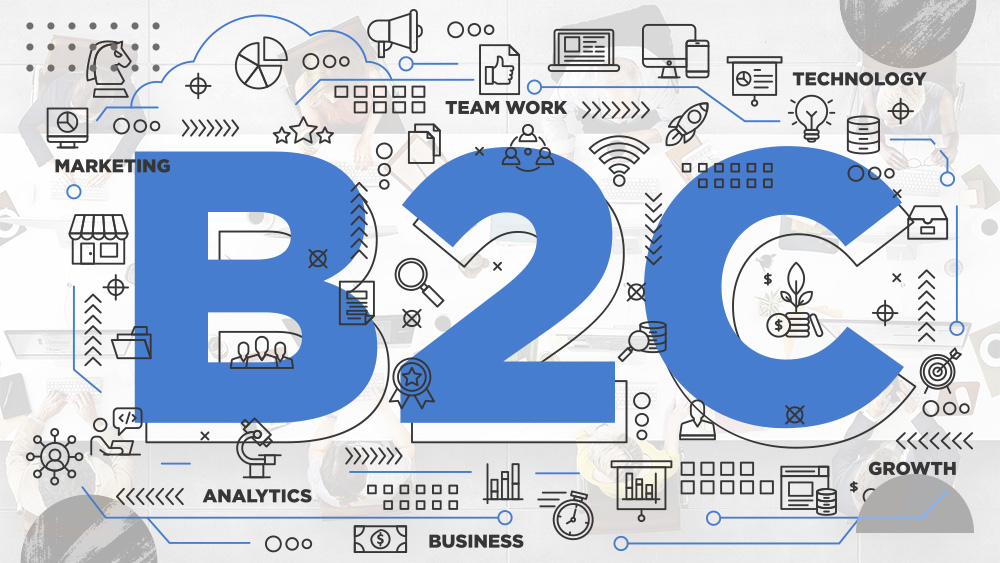Have you ever thought about building a social media marketing strategy for your business? Sure, it may have rung a bell. You might be thinking about your company’s Twitter handle and Facebook page right now. Well, that’s not enough. When did you post last time on either one of these platforms? Perhaps, you haven’t had a chance to establish a B2C social media marketing strategy. Some brands and entrepreneurs talk about social media existence and they have been able to turn things around through social media.
Read-Up on How to Create a B2B Social Media Strategy
First things first, it doesn’t happen on a whim. Most brands, influencers, and entrepreneurs who get a ton of followers and attention spend a lot of time creating useful content and engaging with like-minded audiences through their content.
Therefore, we decided to shed some light on building a B2C social media marketing strategy for businesses so that small and mid-sized companies could put reins on the growth opportunities popping right in front of them.
Before we go deep into the topic, here’s a bit of explanation about B2C social media marketing strategy.
What’s a B2C Social Media Marketing Strategy?
Haven’t heard of b2b vs b2c social media marketing? B2C is an abbreviation for “Business to Consumers” — a business model in which products and services are sold directly to the end consumers. It’s a social media marketing strategy designed for businesses that sell directly to consumers.
A social media strategy is a social media road map that guides the users in creating and publishing social media content across different social media platforms. The reason behind creating a social media strategy is to streamline the social media publishing process.
It usually includes:
- Social media platforms selection to post content such as Facebook, LinkedIn, YouTube, and Twitter
- Starting a social media engagement process to establish a connection with the audience
- A social media scheduling tool to schedule social content across multiple platforms
- The best posting time on social media so that the content gets maximum reach
- To keep an eye on the social media analytics to find the winner content
Therefore, it’s essential to manifest that a B2C social media marketing strategy revolves around attracting and engaging direct consumers.
Related Read: How to Build an Effective Social Media Strategy in 2022
Difference Between B2B and B2C Social Media Marketing Strategies
The difference between B2B and B2C social media marketing strategies is that a B2B business uses the platforms, strategies, and offers that attract companies. The intention of a B2B social marketing campaign is always to reach out to the businesses that could be potential buyers or partners.
On the other hand, a B2C social media marketing strategy is more steered towards consumers or end-users. Here are three fundamental differences between social media marketing campaigns of B2B and B2C companies:
- The ads don’t showcase pricing in b2b social media marketing strategy. Whereas a b2c business would want to put the pricing everywhere.
- The products are usually displayed in a large quantity in the b2b social media marketing campaign to indicate the capacity of the manufacturing or production facility.
- Every social media platform is different – so is its audience. Have you ever seen someone from the fashion industry watching YouTube for fashion inspiration or ideas? I reckon you haven’t. The reason is that if someone needs fashion inspiration or ideas, they check out Instagram or Pinterest. A B2C that sells directly to the end consumer must know where its audience exists and how to reach out to them.
Therefore, an effective B2C social media marketing strategy revolves around understanding and implementing a way forward to reach, attract, and convert prospective customers through social media engagement.
How to Build a B2C Social Social Media Marketing Strategy
Let’s dive deep into the steps of building a B2C social media marketing strategy:
- Identify Your Strengths
- Create a Customer Persona
- Choose the Right Social Media Platforms
- Develop a Social Media Content Plan
- Establish a Social Media Workflow
Let’s discuss these steps in detail:
1. Identify Your Strengths
When it comes to building a social media marketing strategy, your strengths come in handy regardless of the category your business falls in.
Your business type/category such as b2b or b2c comes later in the process. The strengths refer to the plus points or the edge you have over competitors. Therefore, identifying your strengths means figuring out the value proposition your brand has to offer. It could be anything that gives you an advantage over the next person, for instance:
- Personal interest in the subject
- Previous job experience in the field
- Expertise in the selected area
- Attended seminars or courses
- Read books or online articles
There is no rocket science behind identifying your strengths but it could lead to a stronger foundation for your B2C marketing.
Suppose you start a business selling leather goods and you want to capitalize on social media to attract, engage, and convert the audience. One of your strengths is graphics designing and photo editing.
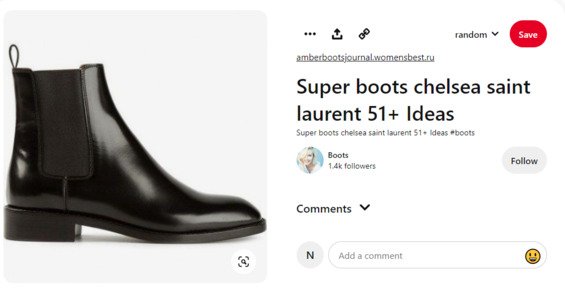
The first thing you do is create a Twitter account for your leather goods and Shopify store because you think Twitter and Facebook are the most popular social media platforms out there. And perhaps that’s where you’re wrong.
You must capitalize on your strengths and start with Instagram and Pinterest instead. Forget about Facebook and Twitter for a few months.
The whole point is that try to figure out who you are and what you can do the best before you hop on social media for marketing.
Related Read: How to market your brand on Pinterest: A complete Guide on Pinterest Marketing
2. Create a Customer Persona
Step two is about creating a customer persona. The persona means traits, values, and uniqueness. So a customer persona is an imaginary audience type that is considered close to the target audience.
Here is an example below:
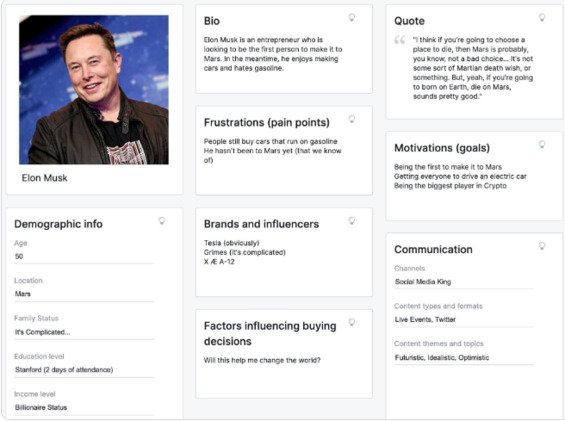
The reason behind creating a customer persona is to lay out the customer attributes. The closer you get to your target audience, the easier it would be to understand their pain point.
Usually, a customer persona includes the information such as:
- Where the target audience exists on social media (or what platforms they prefer)
- What they like to talk about on the internet
- What type of content do they consume on social media
- The best time to reach out to them on social media platforms
- Their social media publishing patterns such as hashtags, content type, and platform choices
If you’re wondering where to begin with creating your customer persona, then don’t get overwhelmed by this. You could do a little bit of research on the following things:
- How did you land your existing customers?
- What social media platform drives the most customer inquiries?
- Which one of your blog posts generates the most leads?
- How did the prospective customers hear about you?
- What social media platform gives you higher engagement?
Related Read: How to Drive 4x Traffic to Your Blog With Contentstudio’s Evergreen Automation
3. Choose the Right Social Media Platforms
Since a b2c business sells directly to the customers, it means there is hardly any middle-man in between them. Unlike b2b businesses that may have wholesalers, distributors, and retailers in the loop. The crux of this step is to start on the right foot. A lot of people make the mistake of choosing the wrong social media platform or signing up on multiple social media platforms at once and end up frustrated. For instance, if a recruitment agency wants to work with brands looking to hire people as well as job seekers, then the best social media platform for them is LinkedIn. Here’s an example:

It’s because LinkedIn is a professional network and most people use LinkedIn to find new jobs or part-time gigs. Besides, brands and organizations also use LinkedIn to post job vacancies and find the right candidates for the jobs. Therefore, it’s essential to opt for the right social media platforms in order to establish a solid b2c social media strategy.
Learn more about LinkedIn Content Strategy: Building a Content Plan to Skyrocket LinkedIn Reach
4. Develop a Social Media Content Plan
After figuring out the right social media platform, a b2c business must comprehend the fact that social media presence does nothing unless content publishing is not involved.
Therefore, it’s inevitable to develop a social media content plan to skyrocket your b2c business reach on social media.
Since the b2c businesses are closely associated with the end consumers, the social media content must also revolve around the end-users. Here is an example of how Habitat entices its customers to buy its products at reduced prices.

Think about what a consumer needs from the market. Put yourself in a consumer’s shoes and try to comprehend what you think when shopping. The fundamentals of a social media content plan are to encapsulate a bundle of things in one packaging, for instance:
- Finding a like-minded audience to connect with
- Building a relationship with the prospective customers
- Identifying the pain points of the target audience
- Providing the solutions to the end-consumers problems
- Plugging your product or service without being salesy
So here are the essentials of building a social media content plan:
Choose social media platforms
Before you dig deeper into social media content planning, think about the social media platforms to hop on. You can’t blindly start creating social media content without realizing the nuts and bolts of a social media platform. Every social media platform has a different size for images. Therefore, choose social media platforms wisely.
Select the right type of content media
Once the social media platforms have been chosen to put out content, it’s important to select the type of content media to publish. There are articles, videos, images, and podcasts — select the ones you or your team is comfortable with. The social platform and content media selection go hand-in-hand.
Learn to Create a Winning Social Media Content Calendar in 2022 [+Free Template]
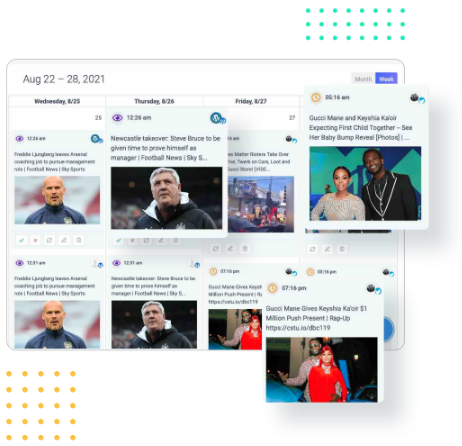
Social Media Calendar for Digital Agencies
Organize all your social posts and visualize your client’s social media content plan with an interactive Content Calendar
14 days free trial – no credit card requiredBuild a team of content creators
One of the fundamentals of creating content is building a team of content creators – they could be video makers, video editors, content writers, content editors, podcasters, graphics designers, etc. Pay close attention to hiring the content creators according to your social media marketing strategy, for instance, if you’re going all-in with publishing articles, you might not want to hire a video editor.
Handpick niche-relevant topics to cover
Once the team and strategy start to fall in place, it’s time to work on the topic selection. Always do some due diligence and market analysis before selecting the topics. A lot of brands and experts do keyword research before writing articles or making YouTube videos. You can replicate the experts’ strategy and do the same thing.
Related Read: 30 Evergreen Content Ideas for Content Marketing in 2022
Use content creation resources
There are several content creation tools and resources that you might want to check out:
Canva is a fantastic tool for creating online graphics and images.
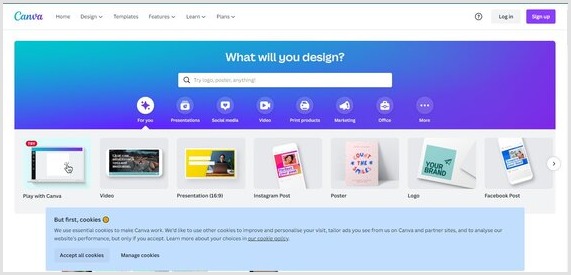
DepositPhotos is a stock-photography site for buying photos.
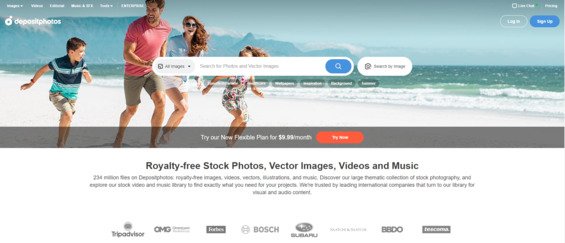
Simplified.co is an online video and presentation maker.

Artlist.io is a royalty-free music service for creators and video makers.
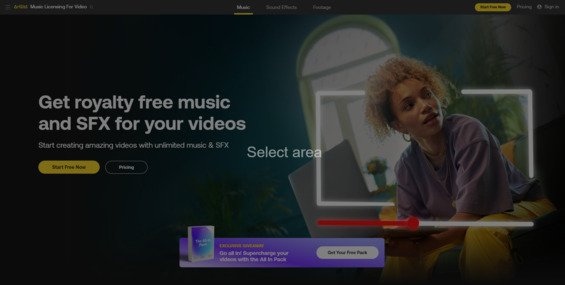
Moreover, there are plenty of online tools out there. You can choose whichever you like the best. So these were the essential elements of building a social media content plan.
5. Establish a Social Media Workflow
Social media workflow is a buzzword in the digital marketing space, and it usually revolves around social media marketing automation.
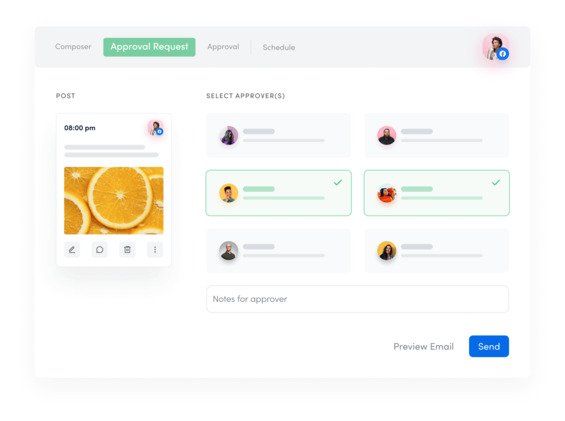
The crux of social media workflows is to build a system around planning, creating, launching, and measuring social media marketing activities.
It covers several social media content stages and assists the social media management team in overseeing or managing the content publishing process. Essentially, developing a social media workflow means crafting a social media management plan to implement the strategies, SOPs, and distribution of the social media content. Here are six social media workflow stages:
Ideation phase
The ideation phase is the initial level where the brainstorming begins, ideas are floated, and notes are taken. It’s important to handpick the content ideas after proper keyword research, search analysis, and topic demand across several platforms, such as Google, Quora, Pinterest, and Twitter.
Media and assets building
At stage two, you have skimmed through a bunch of ideas and got your hands on the best ones. Now it’s time to build media/assets to support and promote the content. It usually means featured images, screenshots, and social media posts.
Content crafting
Once the ideas have been finalized and the media content is being developed, the content writers start working on the pieces. Most of the time, the outlines are given to the content writers to follow. At this point, you may have graphics designers designing the social media posts and additional images, whereas the writers are pumping out articles.
Approval workflow
Once everything starts to fall in place, meaning the social media team gets the written pieces and imagery from graphics designers, the next up is the submission. You could use ContentStudio – it’s a state-of-the-art social media management tool for agencies and businesses.
It offers social media scheduling, analytics, curation, and workflows. Your social media internee or junior social media publisher could submit the social media posts for approval using ContentStudio’s team approval system.
Boost productivity with publishing or scheduling
Once the social media content has been approved, it’s time to hit the button. The social media manager could either publish it right away or schedule it for later. It doesn’t end here because publishing content blindly won’t help your B2C social media marketing strategy. Read the next step to fully understand the idea.
Go through 21 Social Media Posting and Scheduling Tools of All Times to make publishing or scheduling easier for yourself!
Track analytics and conduct meaningful reporting
Once it’s been a few days since you publish those posts on social media, it’s time to dig deeper into the analytics. Head over to your social media analytics to see which content pieces are doing well and which ones didn’t get any traction. It’s important to identify the winner pieces to double down on similar topics in the future. Furthermore, ContentStudio has an Analytics section to keep track of your social media content.
That’s it.
Don’t get overwhelmed by the structures, patterns, and standards to follow in B2C marketing automation. These are the key ingredients of a B2C social media marketing campaign.
Examples of B2C Social Media Marketing
The core element of a B2C business is that it sells products or services to the end-user rather than businesses. To further educate you on business-to-consumer social media marketing, it’s important to highlight some examples to sharpen your B2C social media marketing strategy. Here are three examples of B2C social media marketing:
Example #1: Amazon
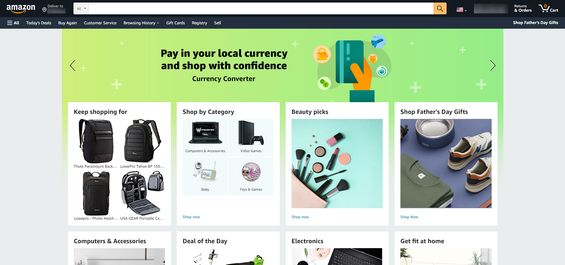
Amazon is the largest online retail store in the United States. Plus, it also operates in several European and Asian countries. It’s highly unlikely that you live in the US or UK and you never ordered something from Amazon.Amazon is a perfect example of B2C marketing. Hence, it’s worth looking at when figuring out B2C social media marketing. Take a look at this tweet from the e-commerce giant:
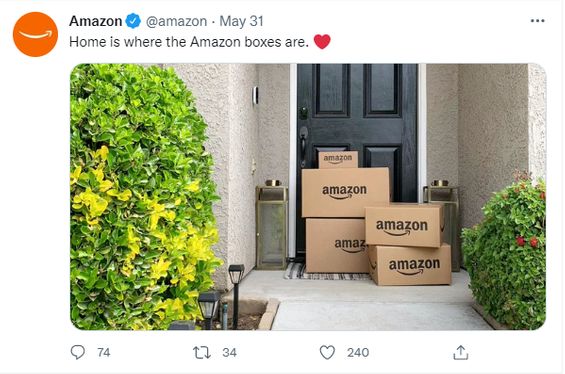
Amazon tweeted the picture of the boxes delivered on the doorstep and the purpose is to solidify the brand-to-consumer relationship. Above all, it’s a perfect example of a B2C business model.
Example #2: StreamYard
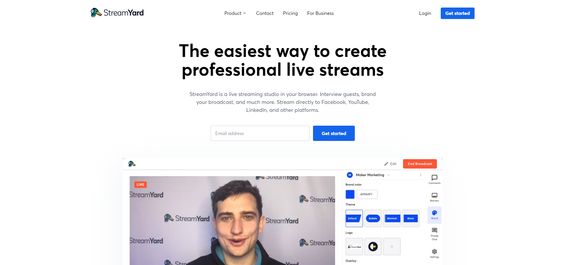
StreamYard is a popular live streaming software that provides users with cutting-edge online video streaming services. It’s widely used by entrepreneurs, bloggers, affiliate marketers, and social media influencers. This streaming software company has quite a following across all social media platforms. Check out their LinkedIn post:
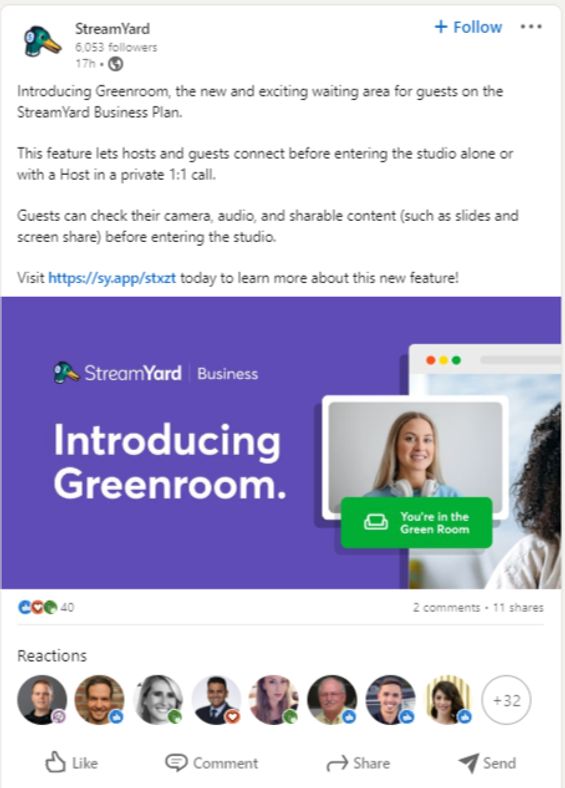
They shared a new feature added to their live streaming software with their LinkedIn followers. It depicts that it’s essential to keep your audience and loyal fans updated across all social media networks.
Example #3: WPS Office

WPS Office is a complete office suite that has several sections such as documents, presentations, PDFs, spreadsheets, and more – it’s a great alternative to MS Office. The team at WPS is quite active on social media. Here’s the example:
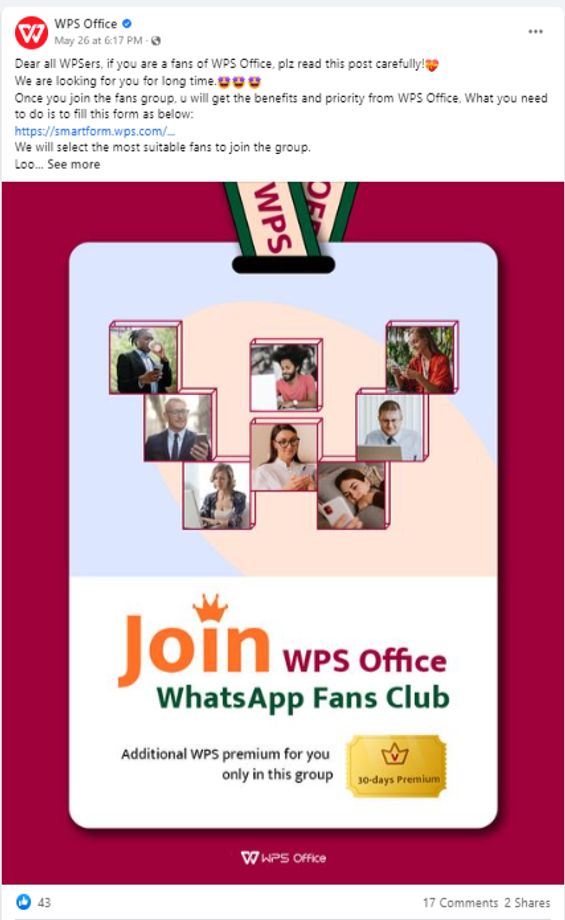
The Facebook post from WPS invites the fans to join the WPS WhatsApp group. It shows that they’re using the traditional social media platform to bring loyal fans closer to the brand using other communication mediums. The above-mentioned B2C marketing strategies on social media tell us that it’s necessary to hop on the right social media platforms and engage with our followers. Plus, adopt strategies that entice the fans to react, respond, and reply to you.
Let’s Conclude
A B2C social media marketing strategy encompasses a dedicated, customer-oriented content marketing plan that effectively finds, attracts, and converts the prospects into paying customers.
Social media and content marketing go hand-in-hand; you can dominate social media if you aren’t putting out great content. Similarly, if your content marketing efforts don’t include social media, you’re doing it wrong.
Even though it’s a fact that choosing the right social media platforms is the stepping to building a powerful B2C social media marketing strategy, it’s not the only thing that matters in the process. Your creativity, consistency, and copywriting take your social media campaign to the next level. Always remember that social media marketing success doesn’t happen on a whim. You have to put your heart and soul into it over the next few years to get where you want to be.
The nitty-gritty of establishing a successful B2C social media marketing campaign is to recognize your strengths for creating social media content and put out content systematically using the social media marketing tools available at your disposal.
What else would you do to build a B2C social media marketing strategy?
Let us know on the social media channels!
